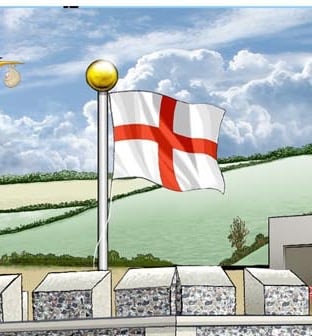Veteran British jigsaw puzzle artist Mike Jupp has made headlines after publicly accusing Gibsons Games—a century-old family-run company—of censoring elements of his artwork in the name of “diversity and inclusion.” The 77-year-old illustrator, known for his humorous and detailed scenes of British life, claims he was told to remove the St George’s flag, a depiction of Morris dancers, and a busty woman in a bathtub from one of his latest puzzle designs.
The dispute has since led to the end of Jupp’s long-running collaboration with Gibsons and sparked nationwide debate on the boundaries of political correctness, artistic freedom, and the evolving role of traditional imagery in modern entertainment.
The Flag Controversy: What Was Removed?
The row centers around Jupp’s latest puzzle titled I Love Spring, part of his much-loved “I Love…” series, known for its chaotic, colourful, and quintessentially British illustrations. According to Jupp, Gibsons Games demanded the removal of:
- The St George’s flag from atop a church.
- Morris dancers, a nod to English folk tradition.
- A cartoon image of a voluptuous woman in a bathtub, drawn in the same humorous spirit as the rest of the piece.
Jupp claims these edits were requested under a company-wide “diversity and inclusion” initiative.
“Telling a cartoonist how to depict humour is as disrespectful as it is infuriating,” said Jupp, lamenting the loss of traditional British icons to what he perceives as modern hypersensitivity. “We are in danger of having our culture scrubbed away to appease a tiny minority.”
Gibsons Games Responds
In response to the growing public interest, Gibsons Games issued a measured statement expressing gratitude for Jupp’s years of collaboration while standing by their decision.
Kate Gibson, Managing Director, commented:
“As a company, we have always strived to act in accordance with our values of inclusivity and respect. We deeply value all the artists we work with and wish Mike all the best for the future.”
While the company has not released specifics about the decision-making process, it emphasized a commitment to being sensitive to the perspectives of a diverse consumer base.
A Split Over Values: Creativity vs. Corporate Responsibility
The fallout between Jupp and Gibsons represents a broader cultural debate playing out across industries: how far should companies go in aligning with modern values, and at what cost to creative expression?
Jupp, whose artwork is instantly recognizable for its wit and satirical edge, says this isn’t the first time he has been asked to tone things down—but this was the final straw. His fans argue that the removal of harmless cultural elements like the English flag or folk dancers is an overreach, symptomatic of the broader “cancel culture” phenomenon.
However, others see Gibsons’ actions as part of a necessary evolution toward more inclusive representation in commercial art, where brands are increasingly held accountable for the cultural messages they promote.
New Beginnings: Jupp Joins All Jigsaw Puzzles
Despite the setback, Jupp has moved swiftly to keep his puzzles on the market. He has joined forces with Devon-based All Jigsaw Puzzles, which he claims supports his artistic vision without compromise.
Although the switch has resulted in a noticeable drop in income due to smaller print runs and different distribution channels, Jupp remains defiant.
“It’s not about the money—it’s about the principle. If I can’t draw Britain as I see it, what’s the point?”
Fans can now purchase his uncensored designs directly from All Jigsaw Puzzles’ website, many of which still proudly feature Morris dancers, pub scenes, and classic British humor.
Public Reaction: Divided and Passionate
The controversy has stirred strong public opinion on social media and beyond. Supporters of Jupp see him as a defender of free expression and British tradition, while critics argue that commercial artwork, especially in mass-market products, must evolve to reflect a changing society.
Some have even launched online petitions demanding Gibsons reinstate the original puzzle design, while others praise the company for upholding inclusive standards.
Conclusion
The clash between Mike Jupp and Gibsons Games is more than just a disagreement over a jigsaw puzzle—it’s a snapshot of the tension between traditional cultural imagery and the modern push for diversity and inclusion. As Britain grapples with questions of identity, heritage, and representation, debates like these are likely to become more frequent—and more heated.
Whether you see this as a case of political correctness gone too far or a responsible move by a forward-looking brand, one thing is certain: puzzles have never been this controversial.
FAQs
Q1: Who is Mike Jupp?
A1: Mike Jupp is a British artist known for his intricate and humorous jigsaw puzzle designs, especially the popular “I Love…” series.
Q2: What did Gibsons Games ask Jupp to remove from his puzzle?
A2: Jupp claims they asked him to remove the St George’s flag, Morris dancers, and a busty woman in a bathtub as part of a diversity and inclusion review.
Q3: Why did Jupp leave Gibsons Games?
A3: Jupp said he ended his relationship with the company over creative differences related to their content censorship.
Q4: Where can I buy Mike Jupp’s uncensored puzzles now?
A4: Jupp’s puzzles are now available through All Jigsaw Puzzles, a UK-based puzzle company that supports his original designs.
Q5: What has been the public reaction to this controversy?
A5: Reaction has been divided, with some supporting Jupp’s stand for artistic freedom and others praising Gibsons for promoting inclusive values.



